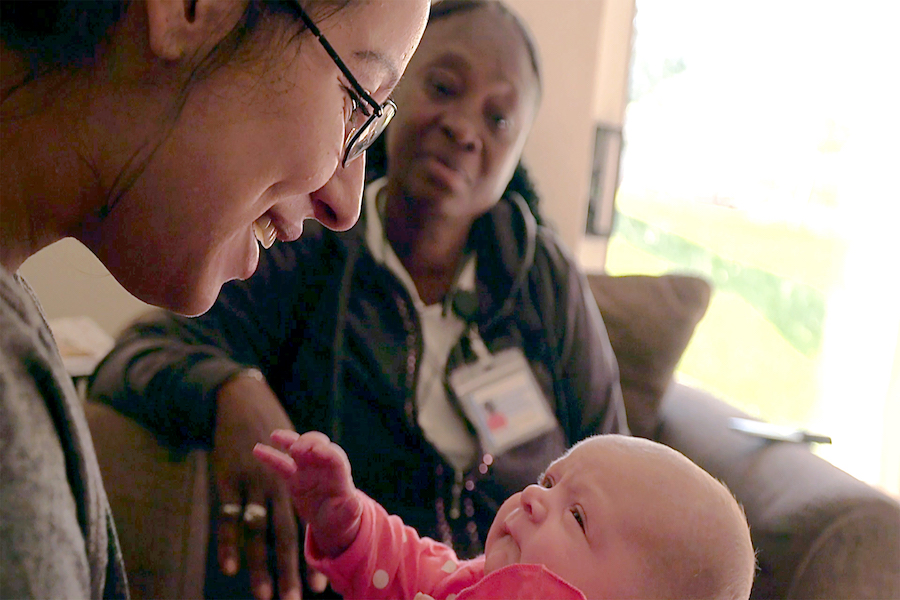American film festival features Medill, NU-Q student work
Courtesy of Jessica Martinaitis
A woman recovering from addiction holds her baby. Jessica Martinaitis (Medill MSJ ’19) followed the young mother for her film documenting the repercussions of a Wisconsin law that punishes mothers and pregnant women with substance abuse issues.
October 26, 2020
Six NU student-produced documentaries premiered this September at the American Documentary and Animation Film Festival. Five were by Medill students and one was by a Northwestern University in Qatar student.
Medill Prof. Brent Huffman worked with the creators of all six films to submit to the festival, which was delayed from March to September and ultimately held virtually due to the pandemic.
Melissa Hovanes (Medill MSJ ’19), who worked on “Prime Time: A Rapper Battles the Machine” with two other students in Prof. Huffman’s graduate documentary class, said her group took advantage of the postponement to reconnect with their subject, Chicago Ald. Andre Vasquez (40th), who unseated a 36-year incumbent in 2019.
Hovanes and her co-directors updated the film to include Vasquez’s work around the pandemic and racial justice in the past few months, she said.
“From the beginning, I knew that Andre’s story was this really great way to tell a story about more systemic issues,” Hovanes said. “One of his major platforms throughout the campaign was this Civilian Police Accountability Council in Chicago, and that’s definitely a big part of what he’s doing now, especially in the wake of the murder of George Floyd.”
Jessica Martinaitis (Medill MSJ ’19) also worked in Prof. Huffman’s class to film her documentary, “Recovering Motherhood,” which follows three women in Madison, Wisc. recovering from addiction and living in fear of a Wisconsin law that punishes pregnant women suspected of using drugs.
Martinaitis said she and her co-director traveled to Wisconsin several days a week for an entire quarter to forge relationships with the women and gain their trust. Unexpectedly, one of their subjects had disappeared for ten weeks right before they began filming.
“Even though she had been clean, she had a lot of residual issues that come along with recovery — a lack of trust, a fear of judgment, going out of communication and pulling away,” she said. “We ended up filming her, but it took persistence and patience and just going out there and getting to know her, camera turned off.”
Two of the five films were by Medill undergraduates, including “Reaching for Solid Ground,” which chronicles director Slade Warnken’s (Medill ’20) first trip home after beginning gender-affirming hormone therapy.
Warnken and her group drove down to Kansas for a weekend in April 2019, filming over three days and then editing in the final two weeks of the quarter for Prof. Huffman’s class, she said.
“My parents and I don’t talk about these things very much,” she said. “This documentary was an effort to create a space where all three of us were people that experienced gender in our own ways, and we all knew what it meant to have to define ourselves as man or woman, and to feel uncomfortable with that. It just created this common sense of understanding.”
While she was the only NU-Q student featured this year, Mariam Al-Dhubhani (NU-Q ’18) also focused on issues closer to home with her film “In the Middle,” which follows a young Yemeni man forced to join the army after the collapse of the country’s economy left few other options.
The documentary is Al-Dhubhani’s second to feature in the American Documentary and Animation Film Festival, and she said it’s important to her that American audiences see her work.
“Yemen is known for famine or death or just another war in the Middle East,” Al-Dhubhani said. “And so it’s beautiful to see another human who is just like you, who is in love, who is educated, and he’s just facing different circumstances. This is extremely important to break the stereotype of what Yemen is.”
Because the United States has suspended granting visas to Yemeni citizens, Al-Dhubhani, who has won multiple awards at American film festivals since graduating, has not been able to meet any of her American audiences.
“I wish there was a possibility to have a Q&A or reach more of the audience,” she said, “but despite the travel ban, despite everything that’s happening, it’s still an incredible win.”
Email: [email protected]
Twitter: @maiapandey
Related Stories:
— “We’re going to make an impact this year”: Chicago International Film Festival optimistic about virtual premieres
— NU alum’s documentary follows international student’s disappearance, wins award at SXSW


